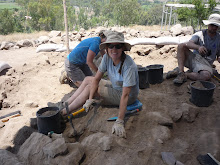Is it always necessary to suspend one’s beliefs in order to critically and objectively study from an academic point of view? Are we not all influenced by our beliefs, whether they are religious or not, when we approach our subjects? Is it better to use an insider or outsider approach to the study of religion? Or is there an alternative?
Since I am not an ethnographer nor am I able to use participant observation in any of my research I was initially quite stumped at how I was going to write about anything relevant to this week’s readings. In a discussion with Emily, she helped me to see some of the connections between my work and the writings of Simon Coleman. One of the methodological issues which I think is prevalent throughout religious studies was one which we did not discuss much this year, the insider-outsider approach.
Since it has been something which I have wrestled with this year, and since this is the final blog I might as well bring it to the table. To put it bluntly, which is better? Insider or Outsider? Or is there another way?
Coleman writes about his ethnographic research with the “Word of Life Foundation” in Sweden. He questions the relationship between fieldworkers and their objects of study by pointing out that there appears to be a two-way relationship between participant and observer. In reference to the “Word of Life” community, he writes that “in certain respects, their activities seem surprisingly similar to those of secular anthropologists…they have prompted me to wonder about the nature and direction of mimesis in my fieldwork: Who, in other words, has been mimicking who?” (But are they Really Christian, 78).
I think that Coleman is turning the very question about the insider-outsider debate on its head. He asks: “must we continue to assume that there is a fundamental divide between “the field” and “home”?” (But are they Really Christian, 78). This divide is what the entire insider-outsider debate is hinged upon. If there were not a sense of us versus them, the debate would essentially become irrelevant.
A different approach to using the insider-outsider is only possible if we are able to go beyond our desire to see ourselves in a one-way relationship with our object(s) of research. A one-way relationship would be distancing oneself from the object in a way that ensures that they may analyze and transmit this information away from their object. In fieldwork, this would be properly representing a group objectively by creating a divide (not literally, but in a personal sense) between oneself and their subjects. I think that by acknowledging a two-way relationship, one in which both the subjects influence the observer and the observer gathers data on the subjects is an alternative to the insider-outsider approach. This new approach, which is suggested in Coleman’s article attacks the notion of “the ethnographic myth that the places and people we study are bounded, self-contained, and incapable of their own reflexive responses to multiple discourses” (86).
By understanding better the relationship between the participant and observer (or text and interpreter/ translator) it is not necessary to suspend one’s beliefs when analyzing a particular religious group/text/movement/etc. Rather, it is important to see how the subjects and objects of study may have influenced the observer. Coleman wrote in his conclusion that he sees that his own writings are not easily divorceable from the “self-constitution of the Word of Life” (86). I think that this is very insightful. I think that oftentimes Academia is premised upon a set of hierarchical “rules” whereby an academic views themselves as superior to their object of study or the religion to which their group of study ascribes themselves to. I think that Coleman’s idea about the relationship between participant and observer and his acknowledgment of the influence from the ‘Word of Life’ community is a better way of understanding this relationship.
Yıldızların Hüzün Meyveleri
10 years ago

2 comments:
Hey Nat!
I really like what you say about acknowledging the two way relationship between what have traditionally been demarcated as Self and Other. I think to some extent this two-way process that you mention is being facilitated by the presence of diasporic communities in the context of modernity. To some extent we can say that the traditionally conceived Self has become Other. That is, the space from which anthropological scholarship has operated is now itself been reshaped. So we no longer have to look very far for "objects of study"; instead the West itself is in modernity, is both the subject and the object, the Self and the Other.
Hey Nat,
Interesting comment on the acknowledgment of a two way relationship. the best ethnographer I read in the 'Critical Issues in Ethnographer' course I'm taking was called Kupilikula. It was about sorcery in Mozambique, where people have a tendency to craft invisbile lions, helicopters and land mines in order to protect themselves and hurt their neighbours. The book was great because the author went out of his way to break down the divide between 'self' and 'other'. Not only does he put himself, and his feelings and general confusion, into the transcripts of his interviews, but he never challenges the beliefs of the sorcerers. Since they obviously believe that magic exists, he writes his work as if it does. The result is a brilliant work on power relations that doesn't come off as a Scholar looking down from his ivory tower on the silly natives below, but instead acknowledges their role in creating his work.
Post a Comment